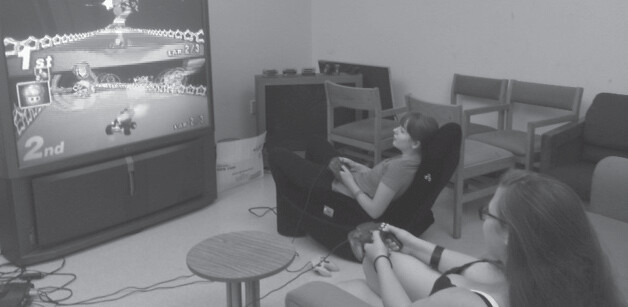
64. Many New College students use the same space to partcipate in gaming culture and wish for it to be more inclusive.
Students at New College have finally started a conversation about gaming culture. The Positive Gaming Club, co-founded earlier this month by thesis student Kaitlin Statz and third-year Hannah Gilbert, attempts to bring that conversation to New College as well as create a welcoming space for new and otherwise underrepresented gamers.
Inspired after a tutorial exploring media and gaming culture from an anthropological perspective, the pair created the club as a safe space to explore conversation within the community.
“The tag ‘gamer’ has a bad reputation, and I wanted to create a space where people could proudly feel like a ‘gamer’ without the negative connotations or stereotypical implications,” Statz wrote in an email.
Gaming culture is not famed for its welcoming nature. It has instead gained a reputation for being intolerant, and in particular sexist, and is portrayed in media as being a straight, cisgendered white man’s world. Slammed for its exclusivity and elitism, the gaming culture has struggled to regain respect as incident after incident seems to only further tarnish its name. However, many voices are popping up attempting to address these issues, and that rise in voices has reached New College.
“[The club] is just another way to talk about the issues,” Gilbert said. “I think listening to the discourse is really important. There are a lot of voices on the Internet right now … I think it’s important to listen to them and not write them off as singular events.”
There are a few gaming clubs on campus already, but, according to Gilbert, none of them have goals similar to the Positive Gaming Club. “We want to have a lot of discussion, not just playing games,” Gilbert said. She also added that other gaming clubs on campus “can be male dominated, which can make it intimidating for people who aren’t men.”
Thesis student James Eveland runs one of the gaming groups, Wallternatives, which meets every Friday and Saturday night in X dorm. He does not see the space as male-dominated but he readily acknowledges that the gaming community as a whole has to some extent earned its bad reputation.
“There’s no denying that, as much as I hate to admit it, the culture is misogynistic,” Eveland said. “It’s just how it is. But it reflects the general public a lot.”
Eveland added that much of the toxicity comes from a small section of the community, “If I have ten players lined up, one of them will be using slurs. It’s not that the entire community is toxic, it’s that the toxic voices are much louder.”
Statz also defended the greater gaming population. “Members of the gaming community are actually far greater than that horrible vision … of a rude basement dweller,” she said.
“Gaming can be a really hostile thing,” second-year Cymri Mellen-Jones, a member of the Positive Gaming Club, said. “The culture makes people uncomfortable and can shy a lot of would-be gamers away from actually playing.”
Another commonly raised issue is the gender divide. “It’s definitely a male-dominated space, there’s no denying it,” Eveland said. However, statistics done by the Entertainment Software Association (ESA) show that the divide is not nearly as extreme as people think. ESA’s 2012 survey showed that 47 percent of people playing games are women.
Gilbert explained that there is a reason for the misconception: “A lot of gaming spaces, and spaces that are in public, are male-dominated,” she said. “A lot of developers are men, and a lot of games are designed with heterosexual men in mind.” This creates an image of a boys’ only club, which, Gilbert said, is simply not the case.
With all these issues coming to a boil, the gaming community is spending increasingly more time examining its own culture and attempting to improve itself. Eveland said he tries to use his position as a judge on the trading-card game Magic: the Gathering (MTG) to silence some of the more offending voices.
“We [judges] try to create a more safe space for players,” Eveland said. “Hurtful speech is not tolerated in [my] community … you will get kicked out and banned.”
Eveland also cited a recent Seattle-based MTG competition in which Feline Longmore, a transgender woman, served as a public example to disbelievers who do not think women and transgender players deserve a space in the gaming community.
Statz and Gilbert have both experienced sexism within the gaming community, but they have not allowed it to scare them away from pursuing their hobbies.
“I’ve tried to use my experiences to springboard into better things, such as forming the Positive Gaming club,” Statz said.
“Within nerd culture as a whole, there are a lot of really big issues,” Mellen-Jones said. “I think [the Positive Gaming Club] is a really great opportunity.”
“Games are fun, engaging and expanding constantly, and the gaming community should be as well,” Statz added.
